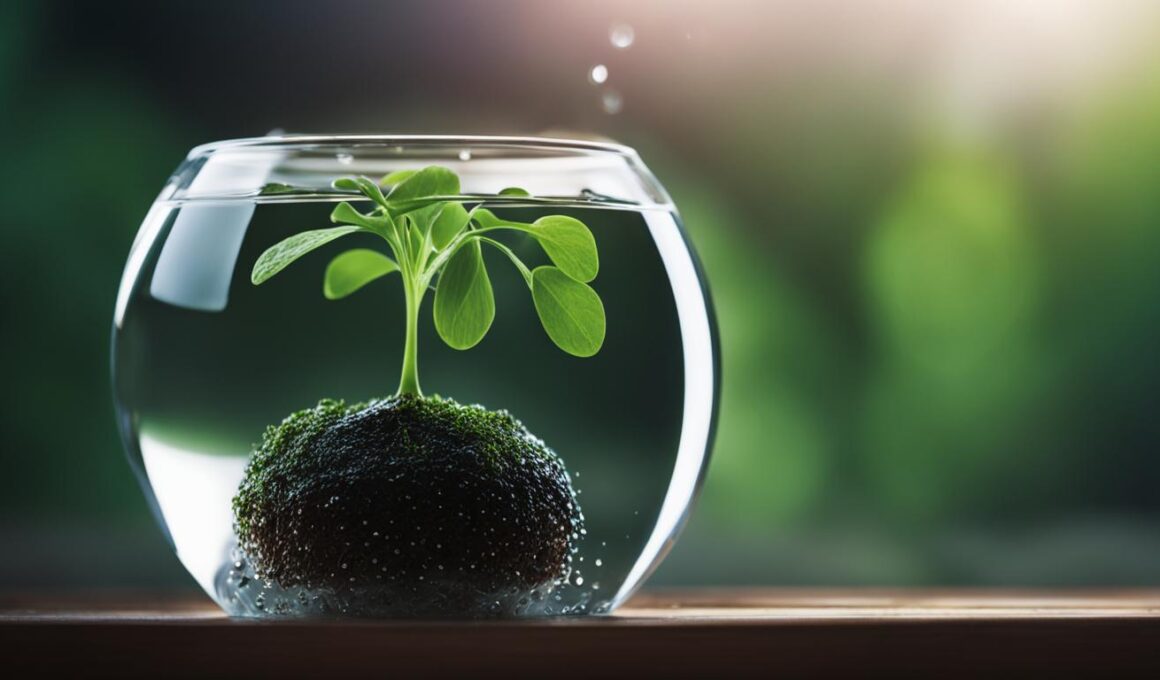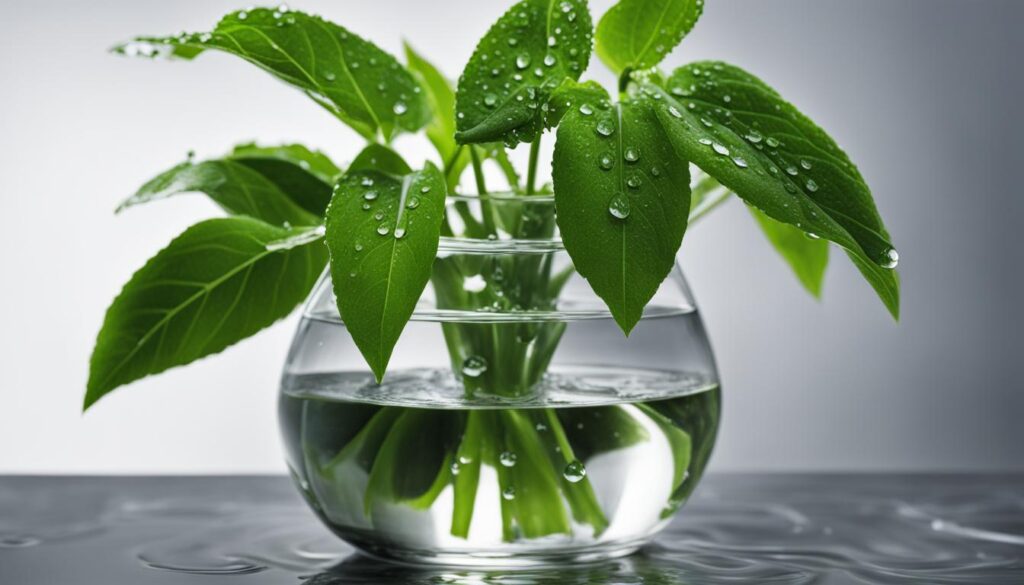When it comes to watering your plants, you want to ensure they receive the best care possible. But with so many options available, it can be confusing to know what’s best for them. One common dilemma is whether to use distilled water or tap water. In this article, we’ll dive into the pros and cons of each and help you make an informed decision.
Post Summary:
- Distilled water is purified and free from contaminants, but lacks essential minerals for plant growth.
- Tap water, when treated with a quality filter, can provide necessary minerals while removing harmful chemicals.
- Consider the specific needs of your plants and the quality of tap water in your area when deciding between distilled water and tap water.
- Filtered water, particularly through activated carbon or reverse osmosis filters, can be a better alternative to distilled water.
- Not all plants are equally sensitive to tap water, so research the tap water quality in your area and the chemicals harmful to plants before making a choice.
Understanding Distilled Water for Plants
Distilled water is a unique form of purified water that undergoes a rigorous process to remove impurities and contaminants. To understand how distilled water benefits plants, it’s essential to know how it is made. Distillation involves boiling water, capturing the vapor, and condensing it back into liquid form. This process effectively removes chemicals, heavy metals, and bacteria, resulting in clean and pure water.
While distilled water can provide a clean source of irrigation for plants, it also has potential drawbacks. One of the main concerns is that distillation removes essential minerals that are necessary for healthy plant growth. These minerals, such as calcium, magnesium, and potassium, play vital roles in various physiological processes, including nutrient uptake and enzyme activation.
As a result, using distilled water exclusively for plants can lead to stunted growth and nutrient deficiencies over time. To mitigate this issue, it is recommended to supplement with nutrient solutions or consider using other types of water that retain essential minerals. Additionally, using distilled water sparingly in combination with tap water can help prevent an excessive buildup of minerals in the soil.
| Benefits of Distilled Water for Plants |
|---|
| 1. Clean and pure water free from chemicals and contaminants. |
| 2. Can be beneficial for plants that are sensitive to impurities in tap water. |
| 3. Reduces the risk of introducing harmful substances to plants. |
Overall, while distilled water provides a pure source of irrigation for plants, it is crucial to consider the potential drawbacks. Supplementing with nutrients or alternating between distilled and tap water can help ensure the optimal growth and health of your plants.
The Benefits of Filtered Water for Plants
Filtered water provides a superior alternative to distilled water for plants, offering several key benefits. When it comes to ensuring the health and vitality of your plants, investing in a quality water filter is a wise choice. Not only does filtered water remove harmful contaminants, but it also retains essential minerals needed for optimal plant growth.
“Filtered water removes harmful contaminants while retaining essential minerals needed for optimal plant growth.”
There are different types of water filters available for plants, including activated carbon, ion exchange, and reverse osmosis filters. Activated carbon filters are effective in removing chlorine, chloramine, and other impurities, ensuring that your plants receive clean and safe water. Ion exchange filters work by exchanging ions in the water, removing heavy metals and other harmful substances.
Reverse osmosis filters are the most comprehensive option, removing a wide range of contaminants, including bacteria, viruses, heavy metals, and chemicals. However, it’s important to note that reverse osmosis filters may also remove beneficial minerals from the water. To address this, consider using reverse osmosis systems with remineralization technology, which adds back essential minerals to the filtered water.
| Filter Type | Contaminants Removed | Beneficial Minerals Retained |
|---|---|---|
| Activated Carbon | Chlorine, chloramine, impurities | Essential minerals |
| Ion Exchange | Heavy metals, harmful substances | Essential minerals |
| Reverse Osmosis | Bacteria, viruses, heavy metals, chemicals | May remove minerals, consider remineralization technology |
Filtered water provides a reliable and sustainable option for watering your plants, ensuring their overall health and well-being. By investing in a quality water filter and choosing the right type for your specific needs, you can provide your plants with the clean and mineral-rich water they require for optimal growth.
Considerations for Tap Water and Plant Sensitivity
When it comes to watering your plants, tap water may be the most convenient option. However, not all plants are equally sensitive to tap water. Some plants, like spider plants, can be affected by the chemicals found in fluoridated tap water. It’s essential to research the tap water quality in your area and cross-reference it with the list of chemicals harmful to plants. Certain chemicals, such as chlorine and chloramine, can harm foliage plants and lead to leaf burn or other signs of toxicity.
If you’re unsure about the quality of your tap water or notice signs of plant distress, using filtered water can be a safer option. Filters, such as activated carbon or reverse osmosis, can remove harmful contaminants while retaining essential minerals. Reverse osmosis filters are particularly effective at removing a wide range of contaminants, but they may also remove healthy nutrients. To ensure your plants receive the necessary minerals, consider using reverse osmosis systems with remineralization technology.
Foliage plants, in particular, tend to be more susceptible to contaminants in tap water. If your tap water is known to contain high levels of certain chemicals, it’s best to err on the side of caution and use filtered or distilled water. However, for plants that are less sensitive or for short-term watering needs, tap water can still be a viable option. Just be sure to monitor your plants closely for any signs of sensitivity or nutrient deficiencies.
Sensitivity to Tap Water: Common Signs
- Leaf burn
- Wilting or drooping
- Yellowing or browning of leaves
- Stunted growth
- Leaves becoming brittle
By paying attention to these signs and taking the necessary precautions, you can ensure that your plants thrive and flourish, regardless of whether you choose tap water or filtered alternatives.
Comparative Analysis of Tap Water and Filtered Water for Plants
| TAP WATER | FILTERED WATER | |
|---|---|---|
| Removes Harmful Contaminants | No | Yes |
| Retains Essential Minerals | Varies depending on water source | Yes (with remineralization technology) |
| Sensitivity of Plants | Some plants may be sensitive | Less likely to cause sensitivity |
| Convenience | Readily available | May require installation of filtration system |
| Cost | Low | Higher initial investment for filtration system |
As seen in the table, tap water may be more convenient and cost-effective, but filtered water offers the advantage of removing harmful contaminants and ensuring the retention of essential minerals. Consider the specific needs of your plants and the quality of your tap water to make an informed decision that promotes their overall health and well-being.
Expert Insights and Alternatives to Distilled Water
Plant experts have weighed in on the use of distilled water for plants and have shared their opinions on whether it is the best choice. According to their expert insights, distilled water may not necessarily be better for houseplants than other options. While distilled water removes contaminants, it also lacks essential minerals that plants need for healthy growth.
Instead, experts suggest using filtered water as an alternative to distilled water. Filtered water, especially when treated with activated carbon, ion exchange, or reverse osmosis filters, can remove harmful contaminants while retaining vital minerals. It provides a clean source of irrigation for plants without the risk of nutrient deficiencies and stunted growth.
Alternating between distilled water and tap water is also recommended. This helps prevent mineral build-up in the soil while ensuring that plants still receive necessary nutrients. Additionally, there are other alternatives to consider. Letting tap water sit out for a day allows additives like chlorine to evaporate, making it safer for plants. Testing the pH of water can also provide insights into its suitability for irrigation. Some plant enthusiasts even collect rainwater as a natural and free alternative to distilled water.
| Expert Insights: | “Filtered water is a better alternative to distilled water for plants.” |
|---|---|
| “Alternating between distilled and tap water can prevent mineral deficiencies.” | |
| “Letting tap water sit out for a day allows chlorine to evaporate.” | |
| “Testing water pH can help determine its suitability for plants.” | |
| “Consider collecting rainwater as a natural alternative to distilled water.” |
Overall, it is important to consider the expert opinions and alternatives to distilled water when caring for your plants. Filtered water, alternating between distilled and tap water, and other options like letting tap water sit or collecting rainwater can provide a healthier and more balanced source of hydration for your plants, ensuring their growth and well-being.
Conclusion
When deciding between distilled water and tap water for your plants, it’s important to consider their specific needs and the quality of tap water in your area.
Distilled water, while providing a clean source of irrigation, lacks essential minerals necessary for healthy plant growth. On the other hand, tap water, when treated with a quality filter, can offer a balance of necessary minerals while removing harmful contaminants.
Ultimately, the choice between distilled water and tap water depends on your plants’ individual requirements and your specific circumstances. It may be beneficial to alternate between the two to prevent mineral build-up without depriving your plants of necessary nutrients.
Other alternatives to distilled water include letting tap water sit out for a day to allow additives to evaporate, testing the pH of water, and considering the use of rainwater for your plants.
FAQ
Is distilled water better for plants than tap water?
Distilled water can provide a clean source of irrigation for plants but lacks essential minerals necessary for healthy growth. Tap water, when treated with a quality water filter, can be a better alternative as it removes harmful contaminants while retaining essential minerals.
How is distilled water made?
Distilled water is produced by boiling water and then condensing the vapor, leaving behind impurities and contaminants.
What are the benefits of distilled water for plants?
Distilled water is free from chemicals, heavy metals, and bacteria, providing a clean source of irrigation. However, it lacks essential minerals needed for healthy growth.
What types of water filters are suitable for plants?
Filtered water, specifically through activated carbon, ion exchange, or reverse osmosis filters, can be used for plants. Reverse osmosis filters are the most effective at removing a wide range of contaminants, but they may also remove healthy nutrients. Activated carbon filters provide clean water for plants without removing essential minerals.
Are all plants equally sensitive to tap water?
Not all plants are equally sensitive to tap water. Some plants, like spider plants, are sensitive to fluoridated water, while others may not mind tap water. Foliage plants, in particular, are more susceptible to contaminants in tap water.
What alternatives are there to distilled water for plants?
Alternatives to distilled water include letting tap water sit out for a day to allow additives to evaporate, testing the pH of water, and considering the use of rainwater for plants.










